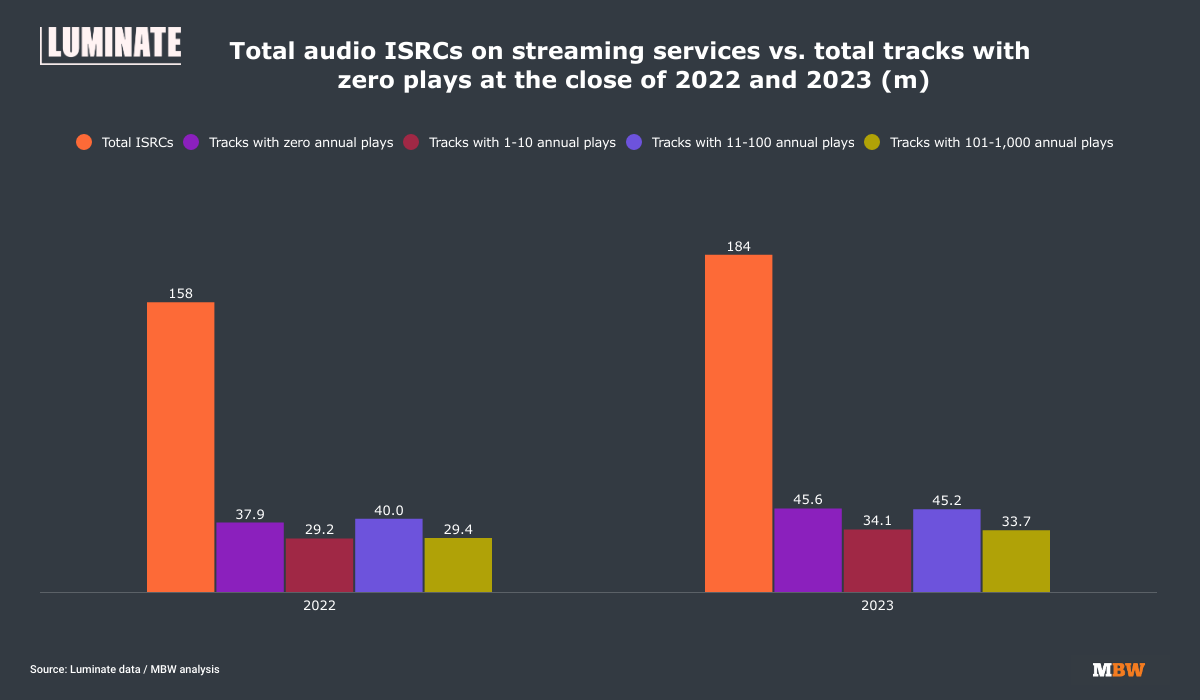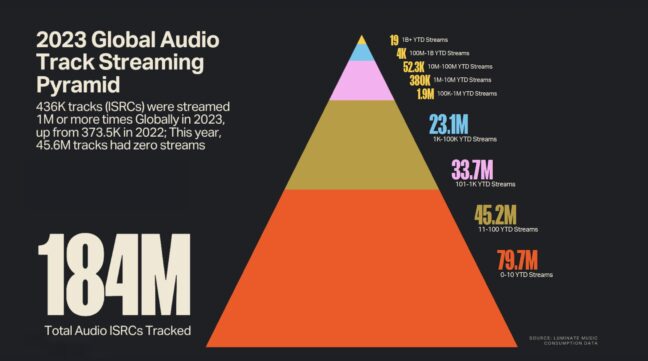158 MILLION TRACKS HAD 1,000 PLAYS OR FEWER ON MUSIC STREAMING SERVICES LAST YEAR. 45 MILLION HAD NO PLAYS AT ALL.
For at least the past year, music industry leaders have voiced unease about the flood of tracks hitting streaming services.
Some worry that, under streaming’s dominant pro-rata royalty system, professional and popular artists’ share of the royalty pie is being diluted by payments going to low-quality tracks.
Others are concerned that high-quality artists will simply be drowned out by this tidal wave of new material – a fear heightened by news last year that an estimated 120,000 new tracks are being uploaded to streaming services every day.
Such considerations have now impacted the policies of leading streaming services – not least Spotify.
In a move seemingly influenced by Universal Music Group’s ‘artist-centric’ strategy, from this quarter (Q1 2024) onwards, Spotify will no longer pay royalties to tracks that have attracted fewer than 1,000 plays on its platform in the prior 12 months.
One very relevant question, then: Just how many tracks on streaming services today are receiving fewer than 1,000 plays per year – and how many are getting no plays at all?
The answer, according to a new report from market monitor Luminate, is a heck of a lot.
According to Luminate’s 2023 Year-End Music Report, fully 158.6 million tracks each received 1,000 or fewer plays on audio streaming services in 2023.
That number amounts to a whopping 86.2% of the 184 million music tracks that Luminate measured on audio streaming services at the close of last year via ISRCs (International Standard Recording Codes).
(These numbers and the two charts below have been updated as of January 11 following new data from Luminate that incorporates Week 52 of 2023.)
Even more tellingly, a total of 45.6 million tracks received zero plays in 2023. That represents 24.8% of the 184 million tracks available on audio streaming platforms.
Yup: nearly a quarter of streaming services’ entire available music catalog wasn’t streamed even once last year.
Luminate has previously reported that approximately 38 million (37.9 million) tracks received zero plays on streaming platforms in 2022, so this figure rose by 20% YoY in 2023, or by 7.7 million.
However, the total number of tracks on streaming platforms also grew last year, up 16.5% YoY.

Indeed, the total amount of music in the global audio-streaming ecosystem soared in 2023.
The 184 million audio tracks on streaming services counted by Luminate at the close of 2023 was up by 26 million vs. the 158 million tracks that Luminate measured at the close of 2022.
To put it another way, there were around 2.17 million fresh tracks uploaded to streaming services per month last year.
The new Luminate report calculates that there was “an average of 103,500 new ISRCs [tracks] delivered to streaming services each day in 2023, which is up 10.8% from 2022 when there was an average of 93,400 delivered each day.”

As you can see above, 79.7 million tracks – just over 43% of all tracks available – received 10 or fewer plays on all audio streaming services in 2023.
This kind of stat helps to explain why audio streaming services have begun to move towards ‘artist-centric’-style payment models, which typically favor artists with larger numbers of streams, and seek to de-monetize unpopular tracks that are each only earning small amounts of royalties per year.
First out of the gate with an ‘artist-centric’ model was Deezer, the Paris-headquartered music streaming service.
In October, it introduced a new payment system in France under which artists who have a minimum of 1,000 streams per month and a minimum of 500 unique listeners receive a so-called “double boost” to royalty payments.
Under that system, artists also receive another “double boost” in their royalty share if they are actively searched for by listeners.
So far, Universal Music Group and Warner Music Group have both signed up for Deezer’s new payment model in France. (UMG Chairman and CEO Sir Lucian Grainge and WMG CEO Robert Kyncl have been among the two most vocal proponents of a change to the streaming payment model.)
IN THE COMING MONTHS, I BELIEVE YOU WILL SEE MORE PLATFORMS ADOPTING THESE PRINCIPLES. WHY?
BECAUSE IT IS THE RIGHT THING TO DO BOTH FOR ARTISTS AND FOR THE WIDER MUSIC ECOSYSTEM.”
SIR LUCIAN GRAINGE, UNIVERSAL MUSIC GROUP
Later last year came the real seismic shift, when the grand-daddy of music DSPs, Spotify, announced it was changing its payment model as well.
In addition to de-monetizing tracks with fewer than 1,000 streams in the previous 12 months, Spotify’s new model (again, launching this quarter – Q1 2024) also requires each track to achieve a minimum number of unique listeners to become eligible for royalty payouts.
So far, Spotify is remaining tight-lipped on what this minimum number of unique listeners is because, it says, it doesn’t want to give this information to “bad actors”.
Meanwhile, Spotify says that “99.5% of all streams” on its platform currently “are of tracks that have at least 1,000 annual streams”, and that “each of those tracks will earn more under this policy”.



